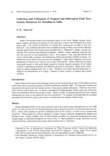Collection and Utilization of Tropical and Subtropical Fruit Tree Genetic Resources for Breeding in India
JIRCAS international symposium series
| ISSN | 13406108 |
|---|---|
| 書誌レコードID(総合目録DB) | AA1100908X |

本文フルテキスト
intlsymp-3_16-26.pdf433.55 KB
India is the second largest fruit-producing country in the world. Mango, banana, citrus, guava, papaya, pineapple and grapes are the important tropical and subtropical fruit crops grown here. The overall productivity of various fruit crops grown in India is very low (9.75t/ha). The problems associated with successful growing of these crops include alternate bearing, malformation and spongy tissue formation (in cv. Alphonso) in mango; bunchy top, panama wilt and burrowing nematode in banana; dieback, tristeza, greening, bacterial canker, foot and root rot and nematodes in citrus; wilt in guava; frost, ring spot and leaf curl virus in North India in papaya, and anthracnose, downy and powdery mildews in grapes. Attempts have been made in the past and are continuing to collect both indigenous and exotic germplasm of various fruit crops for use in fruit improvement. These collections are being maintained mostly in field gene banks located at various research institutes of the Indian Council of Agricultural Research and different agricultural universities. These active collections are being evaluated from time to time. Extensive use of this vast germplasm has resulted in the development of 18 mango, 1 banana, 6 citrus, 5 guava, 11 papaya and 9 grape varieties.
| 作成者 | P. K. Agarwal |
|---|---|
| 公開者 | Japan International Research Center for Agricultural Sciences |
| オンライン掲載日 | |
| 号 | 3 |
| 開始ページ | 16 |
| 終了ページ | 26 |
| 言語 | eng |
